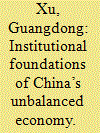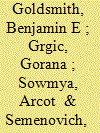| Srl | Item |
| 1 |
ID:
142105


|
|
|
|
|
| Summary/Abstract |
China has become a fast-growing economy with an unbalanced economic structure. Economic policies, especially fiscal and financial policies, contribute to the current growth model by depressing household disposable income and reducing the social services provided by the government. Laws that have been used by the government to subsidise investment and production by distorting factor markets are also to blame. Finally, rebalancing China’s growth pattern has proven to be extremely difficult due to political obstacles, including pressure from interest groups, gridlock caused by factional politics, and ideological discrimination against private entrepreneurs.
|
|
|
|
|
|
|
|
|
|
|
|
|
|
|
|
| 2 |
ID:
154392


|
|
|
|
|
| Summary/Abstract |
Although some scholars claim that the empirical evidence for the very low instance of interstate war between democracies is well established, others have raised new challenges. But even if democratic peace is observed, its theoretical explanation remains unresolved. Consensus has not emerged among competing approaches, some of which are criticized for offering monadic logic for a dyadic phenomenon. This article synthesizes recent literature to advance a simple, but distinct, explicitly dyadic theory about institutionalized political competition, leading to expectations that it is the most important source of democratic peace. While the authors are far from the first to consider political competition, their approach stands out in according it the central role in a dyadic theory focused on the regime type of initiators and target states. They argue that potential vulnerability to opposition criticism on target-regime-specific normative and costs-of-war bases is more fundamental than mechanisms such as audience costs, informational effects, or public goods logic. Incumbents in high-competition states will be reluctant to initiate conflict with a democracy due to anticipated inability to defend the conflict as right, necessary, and winnable. The authors present new and highly robust evidence that democratic peace is neither spurious nor a methodological artifact, and that it can be attributed to high-competition states’ aversion to initiating fights with democracies.
|
|
|
|
|
|
|
|
|
|
|
|
|
|
|
|